
This is an important point at a time when many Christian writers are claiming that it is a waste of time to invest too much attention on this-worldly pursuits like culture, the arts and “secular” vocations. In contrast to the claims of Neo-Anabaptist writers, as well as some reformed theologians associated with the “R2K” movement, Sayers showed that we must avoid a privatized view of redemption that ends up rendering huge segments of life spiritually neutral and “autonomous” (if I can use this term without the accompanying baggage). Sayers’ message is a much needed antidote to the tendency to suppose that what we do in this world is unimportant and that the best we can hope to do is to focus exclusively on the life to come.
In my article “The Real Meaning of ‘Christian’ Work“, I argue this truncated view of redemption leaves little room for a theology of cultural sanctification or earthly teleology, since God’s purposes come to be perceived as being entirely the province of heaven. On this truncated view of redemption, the work of raising families, building cathedrals, trimming hedges, reading novels, and even corporate worship, are often construed as being of only temporal importance at best unless they contain an explicit evangelistic component. This can lead to the ‘seeker-friendly’ posture of accommodation and compromise (what Hunter describes as the ‘relevance to’ paradigm’ of adaptation in To Change the World) or to the more ‘fundamentalist’ and ‘pietist’ posture of retreat and isolation, since in both cases the work of redemption has essentially become privatized and detached from our public life in the material world. Under both approaches, the arenas of art, politics, drama, economics, literature, film, architecture, education, music, fashion design, gardening and the media become ‘secular’ by default. The only disagreement between the isolationism of fundamentalism and accommodating posture of the ‘seeker-friendly’ paradigm is whether one should retreat from this “secular order” or capitulate to it. Fundamentalists will often take the former course while more accommodating and liberal forms of Christianity are more tempted by the second. In both cases, what tends to be left intact is the basic sacred/secular divide. Serious Christian engagement with all of life becomes the chief casualty of this fragmented posture. What emerges is then an amphibious posture in which one’s religious commitments are sequestered from life in the world, with the latter having little to no organic relationship to the former.

